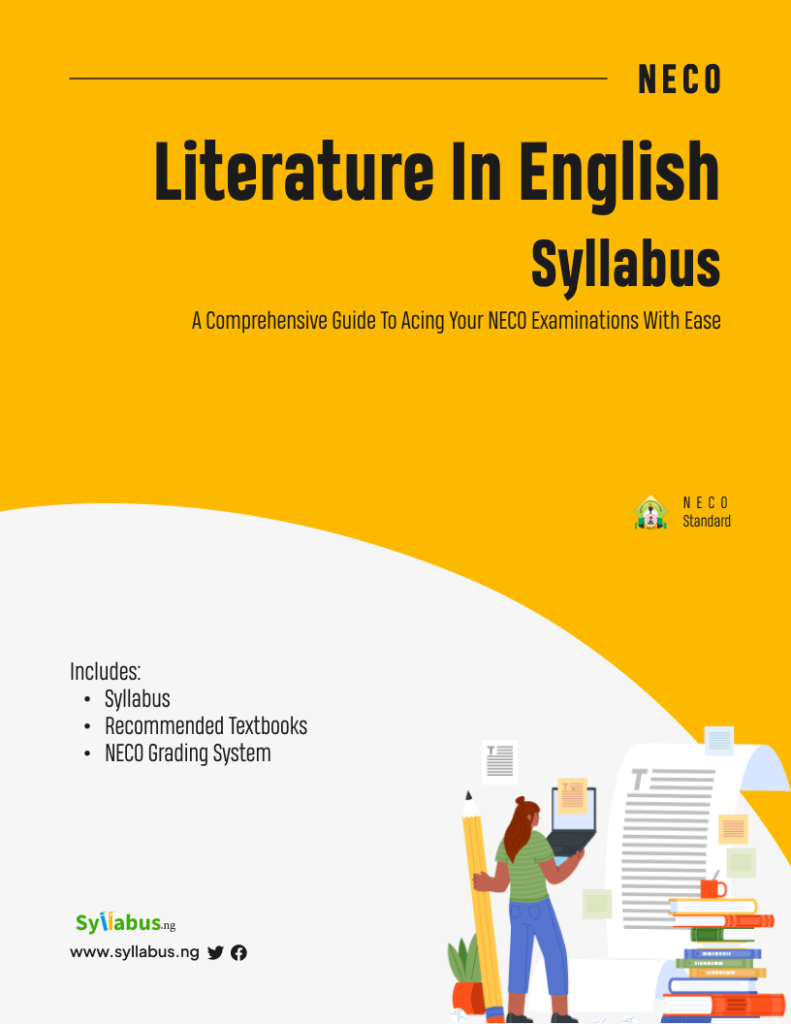NECO Literature-in-English Syllabus
Are you writing Literature-in-English in your NECO O’level exams? Download the recommended Literature-in-English syllabus to excel in your exams. Take the first step in studying smart today.

Home » NECO Syllabus » NECO Literature-in-English SyllabusAbout NECO Literature-in-English Syllabus
If you are on this page you are probably looking for how to ace your NECO Literature exam. Worry no more, you are at the right place , we will guide you on how to ace your exam with the help of this syllabus. The focus of this syllabus is on what you need to know for the exam.
This syllabus will guide you through it all, showing you what to study, what to look for, and how to understand key concepts.
This syllabus will break down the must-read texts, talk about the marking guide and schemes, and help you get to know the recommended texts needed for the exam. Preparation for this exam is more than just reading, it’s about understanding what makes a story great and learning how to talk about it.
Marking Guide & Sections
Let’s break down what you should expect in your exam and what you’ll be expected to do. We’ll cover the marking scheme and how each paper is structured.
Paper 1: Multiple Choice
This is the first part of your exam. Paper one consists of 50 multiple-choice questions divided into: 20 general knowledge on literature, 5 questions on an unseen prose passage, 20 context questions on the prescribed Shakespearean text. All these questions are to be answered in 1 hour and they are worth 50 marks.
Paper 2: Essay Test
This paper is centered on analysis, it has two sections, A and B, focusing on African and Non-African Prose. Two questions will be set for each section. You will only need to answer one question from each section, and each question is worth 25 marks each, with a time frame of 1 hour 15 minutes. In this section, your knowledge about the novels you studied will be tested. Make sure you plan your essay very well while supporting it with examples and arguments.
Paper 3: Drama and Poetry
This paper is where you will be tested on the drama and poetic text you read. It has four sections, each covering different types of literature:
Section A: African Drama.
Section B: Non-African Drama.
Section C: African Poetry.
Section D: Non-African Poetry.
Two questions will be asked from each section, and you are to answer one question from each section, making a total of four questions. You will be given 2 hours 30 minutes to answer these questions and each question is worth 25 marks making it 100 marks in total.
The NECO Literature-in-English Syllabus
Download NECO Literature-in-English Syllabus

Best candidates excel because they study smart and hard. Know what’s expected of you.
Download the NECO recommended Literature-in-English syllabus.
Recommended NECO Literature-in-English Textbooks
Drama
i. African:
1. Wole Soyinka: The Lion and the Jewel
ii. Non-African:
2. John Osborne: Look Back in Anger
Prose
I. African:
3. Alex Agyei-Agyir: Unexpected Joy at Dawn
4. Buchi Emecheta: Second Class Citizen
ii. Non-African:
5. Emily Bronte: Wuthering Heights.
Poetry
i. African:
5. Leopold Sedar Senghor: Black Woman
6. Niyi Osundare: The Leader and the Led
7. Agostinho Neto: The Grieved
8. Oumar Farouk Sesay: The Song of the Women of my Land
9. Lade Wosornu: Raider of the Treasure Trove
10. Onu Chibuike: A Government Driver on his Retirement
ii. Non-African:
12. John Donne: The Good Morrow
13. Maya Angelou: Caged Bird
14. S. Elliot: The Journey of the Magi
15. H Lawrence: Bats
All NECO Syllabus
Frequently Asked Questions About the NECO Literature-in-English Exams
The exam has three papers: Paper 1 is a multiple-choice test, Paper 2 has essay questions, and Paper 3 covers drama and poetry. Paper 1 has general knowledge questions, an unseen prose passage, an unseen poem, and context questions on a Shakespearean text. Paper 2 has essay questions on African and Non-African Prose, while Paper 3 includes questions on drama and poetry from various regions.
For Paper 1, you’ll have 1 hour to answer 50 multiple-choice questions. Paper 2, which has essay questions, gives you 1 hour 15 minutes. For Paper 3, you’ll have 2 hours 30 minutes to answer questions on drama and poetry.
Focus on literary terms, the context of the Shakespearean text, and the ability to analyze short prose and poetry passages in Paper 1. For Paper 2, practice writing essays and understanding themes, characters, and settings. For Paper 3, get familiar with the prescribed drama and poetry texts and be ready to discuss various literary aspects.
In Paper 2, you choose one question from each section,one from African Prose and one from Non-African Prose. In Paper 3, you answer one question from each of the four sections (African Drama, Non-African Drama, African Poetry, Non-African Poetry). In Paper 1, you must answer all 50 multiple-choice questions.
Context questions ask about themes, characterization, style, and setting in the Shakespearean text. They might require you to identify a particular scene, understand a character’s role, or explain a specific line or dialogue. The key is to have a good grasp of the overall plot and the important elements of the play.
The unseen prose passage is about 120-150 words, and the unseen poem is short, so focus on practicing quick analysis. Try to understand the central theme, identify literary devices, and get a sense of the author’s tone and style. Practicing with sample passages and poems is a great way to prepare.
A good essay should have a clear introduction, a body with well-organized paragraphs, and a conclusion. Start by stating your main argument or interpretation, then use examples and evidence to support your points. Be sure to reference specific parts of the text and explain why they are relevant to your argument.
Download NECO Literature-in-English Syllabus

Best candidates excel because they study smart and hard. Know what’s expected of you.
Download the NECO recommended Literature-in-English syllabus.











